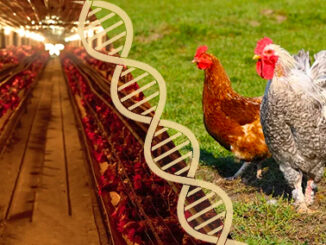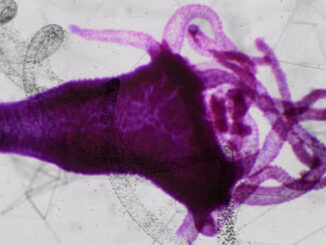Articles that explore the ways in which the environment influences gene expression and epigenetic marks, including information on pollution, toxins, and global warming.
Flame retardants are ubiquitous chemicals added to numerous consumer products to prevent the spread of fire. While they are essential in enhancing fire safety, their widespread use has raised concerns about their environmental and health impacts. One such flame retardant, triphenyl phosphate (TPhP), has gained popularity as an alternative to previously restricted compounds. However, recent studies suggest that TPhP may pose risks to both aquatic ecosystems and human health through its potential to disrupt endocrine systems and alter gene expression. [more…]
A global team of researchers has unveiled a groundbreaking revelation regarding formaldehyde, a pervasive environmental pollutant and a common metabolite in the human body. Contrary to its previous characterization solely as a DNA mutagen, formaldehyde has been found to disrupt the epigenetic programming of cells, establishing a deeper link with cancer. Dr. Lucas Pontel, group leader at the Josep Carreras Leukaemia Research Institute, and Dr. Manel Esteller, group leader and director of the institution, collaborated on the published paper in [more…]
The history of Indigenous peoples in North America has been marked by enduring challenges, including genocide, land loss, and cultural upheaval since the arrival of European settlers. These experiences have left lasting effects on individuals and their cultures, influencing their social, psychological, and physical well-being. There’s a growing interest in understanding how historical traumas like these may be associated with genetic changes, particularly epigenetic changes like DNA methylation. In addition, researchers are exploring how the promotion of cultural preservation within [more…]
In today’s world, there is an increased emphasis on eating healthy and being environmentally friendly. One of the key factors in achieving these goals is the source of the food we eat. Consumers are now more conscious of where their food comes from and want to be sure that it is grown in an environment free of harsh chemicals that supports health. But how can we be sure that the food we’re eating comes from an organic or free-range farm? [more…]
We generally don’t think of plants as being intelligent. But they can learn, communicate, remember, and even make decisions in a stimulus-dependent manner. This ability allows them to modify their behavior to benefit their overall fitness, which is especially helpful when facing adverse environmental challenges like drought or extreme temperature changes. Although plants are just as adept as animals in responding to their surroundings, they lack a cognitive ability, which functions through neural structures and mechanisms. Instead, plant “intelligence” is [more…]
Oxidative stress and antioxidant interaction determine skin aging Oxidative stress damage of the skin, as a fundamental factor of aging, can occur early at birth and continue through one’s entire life. Skin oxidative damage results from an imbalance between reaction oxidative species (ROS) generation and antioxidant defenses, of which unfavorable consequences, such as aging, increased skin diseases, loss of collagen and elastin, increased DNA damage, high skin sensitivity, and increased skin pigmentation can occur. The symptoms are comprised of wrinkling, sagging, [more…]
In 1994, one of the most horrific civil wars took place in the rural country of Rwanda. In a period of about 100 days, nearly one million people died. Most of the dead were Tutsi – a minority group that was targeted for extermination by the government. In the aftermath of the genocide, many survivors were left with mental health problems such as posttraumatic stress disorder (PTSD) and depression. Although decades have passed, the Rwandan people continue to cope with [more…]
If you’re familiar with Greek mythology, you’ve probably heard of the Hydra – a gigantic multi-headed serpent that regenerates two heads for each one it loses. It is after this creature that a small freshwater invertebrate is duly named. The Hydra vulgaris, also known simply as Hydra, is a unique organism that exists in a continuous state of renewal. Cut off its head, and it will grow a new one. How it does this, however, has fascinated scientists for centuries [more…]
Global warming is an ever-growing threat to ecosystems all over the world. Temperatures are continually rising, and weather patterns have become more irregular and aggressive—making it difficult for all organisms to survive. Plants are an essential part of our ecosystem, and their survival can benefit from the rising CO2 levels, but severely high temperatures present a larger problem. Since plants can’t adjust to their climates by getting up and moving around, they must internally regulate their response to heat. Remembering [more…]
The COVID-19 pandemic has impacted the entire world, and many countries have been devastated by the fallout. As this virus swept the world, it has not only changed many aspects of the global economy but also has transformed the way we live our everyday lives. The skin is one of the major body parts that have been impacted by the coronavirus. It’s apparent that frequent usage of personal protective equipment and excessive personal hygiene could trigger different skin conditions. These skin conditions [more…]











